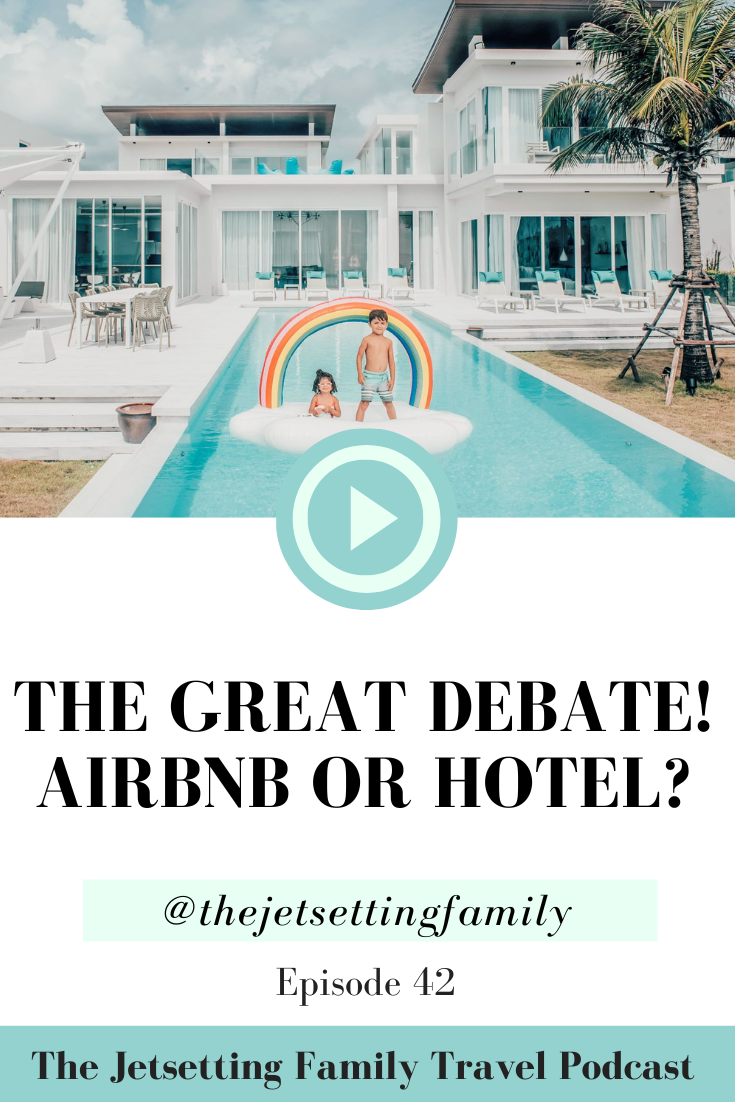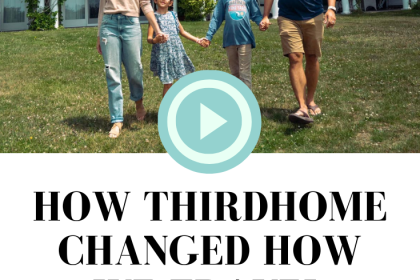When planning a trip, do you pick to stay at a short term rental like an Airbnb or do you opt for a hotel? In this episode we put our debate skills to the test as each one of us chooses a position and tries to find the perfect argument! Who’s going to win out??
Listen on: Apple Podcasts, Spotify, Google Podcasts
Transcript
Rod: Welcome to the Jetsetting Family Travel Podcast. I’m Rod. And I’m Jess. And today we have a really special episode because we have a new type of thing that we are calling the great debate.
Jess: Rod’s going down, I’m just kidding. We’ve never done this type of podcast, but always think it’s fun to try something new.
So, give it a listen and give us your thoughts.
Rod: Yeah. So what is the great debate? It’s a episode where each of us is going to take a position on a topic. Today’s topic is going to be. What should you book on your next trip? An Airbnb or a short term rental versus a hotel? So each of us picks one position.
We’re gonna have kind of like a, I don’t know what a traditional debate I was never in a debate team or anything, but we’re each gonna have opening statements. We’re gonna have our main points that we’re gonna provide. We’re gonna be asking each other questions, and then at the end, either you decide, we decide, I don’t know, whoever wins, wins.
A lot of these topics are kind of gray areas, right? Where there’s not a strict like. Yes, this is the absolute must. There are so many situations and factors involved with it, but we’re gonna give it our best. Yeah, we’ve done both, hotel and Airbnb travel, so this is gonna be exciting.
Jess: Yeah, we thought this would be just a fun new way to kind of do the pro cons list.
Just with a little bit more sass. So Rod, go ahead and start with what you chose.
Rod: Yep. So I am on the Airbnb side of this debate. And I’m about to tell you my opening statement, so here it goes. Hello, esteemed podcast audience. Today we are gathered here to debate the merits of short-term rentals like Airbnbs versus hotels.
As the world of travel and hospitality continues to evolve, it has become clear that Airbnb has disrupted the traditional hotel industry in ways that were once unimaginable. Today, I am proud to take the position that Airbnbs are better than hotels. Not only are they more affordable, but they also provide a variety of unique and authentic experiences that cannot be found in a traditional hotel.
Throughout this debate, I look forward to showing you why you should consider booking an Airbnb instead of a hotel for your next travel adventure.
Jess: You were way more prepared than I.
Rod: Okay. I’m taking this serious over here.
Jess: Hello all. Today I’m here in favor of hotels. I personally believe that the hotel industry has been around for such a long time.
They have honed in on the way they’re gonna accommodate their guests. Hotels offer things that Airbnbs typically cannot, including 24 hour support, multiple restaurants on site, and usually you’re always guaranteed a comfortable bed. Also hotels have mastered the ability to have loyalty programs rewarding you for being a loyal guest.
Something Airbnb has not come around to. There are so many other points I’m willing to debate today on why hotels are a better option for a guest looking for a wonderful vacation. And I plan to prove that to all of you throughout the next series of questions.
Rod: Nice. I am really looking forward to learning about more of those points.
However, I would like to start with the main benefits of Airbnbs. So number one, and really the biggest benefit so far is that Airbnbs are more cost-effective. You have pricing that is consolidated so you’re not getting any hidden fees that you typically get in hotels, like resort fees, parking fees that you don’t really factor into your budget.
When you book an Airbnb, yes, there are cleaning fees and like occupancy taxes and stuff, but those are disclosed right when you book, so you already know what to expect and you’re getting more bang for your. How are you getting that? That’s because Airbnbs are generally more spacious than hotel rooms. So for a family that’s traveling, instead of staying in a single hotel room with two double beds, you can have your choice of a condo, a house.
Or even some really unique experiences like an A-Frame cabin in the woods, or a magical bubble shelter in a forest that gives you 360 degree views of the environment. These types of unique experiences, it’s something that is only available with short-term rentals, and you even get some included amenities that you don’t typically get in hotels, like kitchens.
You have living rooms, you can have a laundry, washer and dryers there. That is so much more easy to use than having to get those types of things in a hotel. If you are confused or if you have questions about what to do in the area that you end up booking, then you generally have very helpful hosts that are willing to offer you advice about what to do in the area.
You can have flexible check-ins, adjustable check-in and checkout time, so really you don’t have to go by corporate policies that hotels are gonna give you for why they can’t or can’t offer you the flexibility that you’re looking for. And ultimately, you by booking an Airbnb, are also helping other people make a living instead of giving your money to a faceless hotel chain.
So those are the main benefits of Airbnbs. Jess, over to you. I’m very curious to hear about your hotel benefits.
Jess: Well, hotels have tons of benefits, something that hotels have that’s a huge benefit compared to Airbnb is quality control. Typically, hotels, especially if you stick to a certain chain, have a standard of cleanliness that is not always guaranteed at Airbnbs. There’s also safety at hand. Not all Airbnbs have carbon monoxide detectors or fire detectors or the basic safety things that most hotel chains due to more rigid standards are required to have. There’s also wifi that’s typically pretty reliable, especially if you’re staying at a nicer hotel.
Hotels in general though, the thing I love most is with the hotel, you have access to immediate remediation. So if something were to break, if the AC were to go out, hotels typically have a 24 hour service team that’s going to quickly be able to assist you, and if they can’t assist you on a large hotel property or even a smaller hotel property, they have the ease and flexibility to typically move you to a new room.
or if they’re fully booked, they have a partner hotel or a partner agreement where they can move you into that facility with no extra charge, no extra hassle. Meanwhile, when you’re with an Airbnb, one of the downfalls is, is sometimes you email your host. Your host, they’re not always available 24 hours.
If they’re at home sleeping, they might not get that notification till the next day. You’re now in a room with no AC in the middle of summer. Then they have to usually find a serviceman who’s a contractor to see if they can go out during all this, and Airbnb a lot of times doesn’t have. A backup option besides refunding you and leaving you to book a last minute Airbnb that might not be of equal quality if it’s during busy season.
So that is one of the big negatives of Airbnb is there’s really no backup plan If things go wrong and there’s not as quick access to help or assistance and the need that something isn’t working right, why would you wanna take that risk on a vacation? Also with Airbnbs, there is no loyalty benefit for, so people who book Airbnbs consistently, there’s not a credit card I that I know of associated currently with Airbnb, such as like you can have a Hilton Rewards card or a Hyatt card.
You’re gaining points, you’re earning free stays. As you become in these top tiers, you now get upgraded to suites for free. And they have all these perks. With Airbnb, you’re just, yes. Giving people money and you get no benefit. Even if you decided to stay at an Airbnb 365 days, there is no upswing to having loyalty to Airbnb.
Rod mentioned that there’s only unique stays available through Airbnbs, but that’s not true. There’s tons of hotels out there that offer incredibly unique stays. You have places like Soneva out in the Maldives where you can stay in this overwater bungalow. And not only that, they have the offer of going on a boat and living on a boat for several days, all with the amenities of their resort.
There is Soneva over in Thailand that offers a Treehouse stay. There are definitely options in the hotel world to have these unique stays, and a lot of hotels now, even luxury chains, are offering more boutique experiences that give kind of that smaller home feel without having to have the lack of service that an Airbnb at times has.
So overall, I think hotels have tremendous benefits when it comes to knowing what you’re getting, especially if you’re loyal to a brand. I know Rod and I love Four Seasons pillows. I love knowing that every time I go to a Four Seasons, I’m gonna have an extremely comfortable bed and my favorite pillow, and I’m just gonna have a wonderful night’s sleep.
That’s something at every Airbnb, it’s a guess. Is the bed hard? Is the pillow soft? Does my internet work? Was the cleaning team great? Those are things that are just unknowns, and so I believe it’s a gamble to book an Airbnb.
Rod: It’s a very interesting, set of benefits that you mentioned and some really interesting attacks that you had on the Airbnb, booking.
And I would love to talk about some of those. One of those you mentioned is safety, not knowing if there’s gonna be carbon monoxide detectors and all that other stuff. One of the great things about the information that is available to you when you’re booking an Airbnb. And we know this because we are hosts for, some of the properties or a property that we have, is you can put in so much information like is there a carbon monoxide detector?
What kind of wifi is there? What is the bandwidth of that? Well, how many, different beds there are in the room, how many kitchen utensils there are, are there washing and drying, equipment in the area? What kind of stove there is. Is it gas? Is it electric? Do they have additional equipment? Say you’re staying by the beach, are you gonna get beach chairs?
Are you gonna get surfboards, paddle boards? Those kinds of things. When you look at a listing on Airbnb, you get such a detailed amount of information that you don’t really get in a hotel. In a hotel you’ll typically get amenities like, yes, there’s a lockbox, or, yes, there’s a hair dryer. Yes, there might be carbon monoxide detectors.
You’ll probably see those in Airbnb as well. But I would argue that Airbnb listings offer so much more information than what a traditional hotel would provide you. Another point that Jess mentioned was about hotel chain rewards programs. How if you’re staying with the same hotel chain, then yes, you’re gonna get some kind of reward scheme that you can redeem for upgrades and all of that.
But you are also sacrificing variety. So if you’re sticking to a hotel chain and you’re only booking Hilton’s or Marriott properties, then you are going to be limited to those locations that offer those hotel chains, and Jess mentioned Soneva and all these like unique experiences. There’s no loyalty or reward program for that.
If you’re booking that, then you are booking that, but you’re also paying a premium because those hotels do offer those experiences, I would argue, as a response to the level of dominance that Airbnb was getting in the market with these unique experiences. So it very much feels like a, a response strictly to compete against Airbnbs and I think Airbnb experiences, especially now with the additional features that they have where you can book city experiences from hosts on the same platform. You can do that without having to go to a concierge. You can look at reviews, right? Whenever you’re getting recommendation from a hotel concierge, you don’t have the group sourced level of information. You’re just getting one person’s opinion on what the best thing for you to do would be.
When you’re using Airbnb’s experiences feature, you can look at the reviews for how other people thought of those experiences and really make much more informed decisions than just simply taking what a hotel is giving you in terms of information. So with that, I think we are hopping into our question and answer round.
So each of us…
Jess: Wait, you got to rebuttal me, but I don’t get to rebuttal you.
Rod: Okay. No, go ahead. I will let you rebuttal.
Jess: Excuse you. When it comes to like, Getting reviews. There’s a beautiful thing called TripAdvisor. There’s also Google reviews. There’s plenty of sites when we look for hotels where you can have an extreme amount of customer reviews and feedback on most experiences.
The hotel, I don’t think that’s a unique feature that Airbnb offers. And I do like the fact that yes, while Airbnb you can list out things that are there. When looking through Airbnbs, it’s often that not all hosts are extremely detailed, stating what they have. There’s also no fact checked. So when I create an Airbnb listing, nobody from Airbnb confirms that what I’m stating to be on there is accurate.
So I might put carbon monoxide detector, fire detector, and there is nobody out there who’s gonna come and check the fact that those things are in place. There is no sort of regulation when it comes to that, and so people could, hopefully they aren’t, but it is very possible that people could be lying in order to receive more bookings.
Whereas a hotel, you know, they’re extremely regulated. They must pass inspections and the things that are in place for safety as such as railings on a stairwell, making sure the balconies safe for your kids, fire detectors, carbon monoxide detectors, all of those things must pass regulations in a hotel.
And they are certified by an actual committee. Not just by a homeowner who can essentially say whatever they want is in that location. And you might arrive there and be surprised that it is not true.
Rod: Yeah, you, you might be, but that is also why previous guests leave reviews on certain properties. Right?
In a hotel, you don’t know what room you’re gonna get assigned. You might have issues with it, you can’t look up the reviews for your hotel room 2345, because that simply doesn’t exist. With an Airbnb, you’re getting a review of the property and the place that you’re staying at, and if there isn’t an amenity that the homeowner or the host has listed, then you’re most likely going to see it in a comment because hosts cannot remove reviews that are being placed by previous guests, that is information that stays there and that is available for you, and that is way more relevant than something that you might get on TripAdvisor, where somebody might have had a completely different experience at the hotel than you’re gonna have because they had a different room or because they had a different availability of whatever experience was available at the time.
So in terms of…
Jess: But there’s also the beauty of being able to change your room. If you arrive at a room and are not happy or satisfied, most of the time you can walk down to the lovely front desk without having to email, wait 12 hours in hopes that this person responds to you and say, you know what? I expected more value for my money than this.
I’m disappointed with A, B and Z. Can you please offer me a different room? And typically they’re able to remediate that extremely quickly.
Rod: Yeah, I, I absolutely agree with the higher risk in an Airbnb. However, when you’re staying at a hotel, you are paying more money to have that coverage, right? So it’s, it’s basically a version of some sort of trip insurance. With Airbnb, yes, you will get the problem sorted out.
If you have major issues, you will most likely get fully reimbursed for your stay, and you will get reassigned to a new place. That’s not something that I can guarantee or confirm that a hotel would do for you. Sometimes, you know, we’ve been treated not as great by hotel staff whenever we do bring up issues.
Or there also are some places where they’re gonna take a while too, just because with the pandemic and the shortening of staff and housekeeping, that is no longer expected to be daily. Right? Some of these amenities have changed in the way that a hotel has an ability to respond to you in as quick as a time.
So it is, I think there’s gonna be a lot of different factors where it’s gonna depend. You might have an Airbnb that is managed by a property management service where they are gonna have people on staff that can help resolve issues. You just don’t know, and you need to check in on it. When you look at the reviews or you look at the listing itself to see who it’s being managed by.
If you have a super host, then you most likely have a higher degree of comfort because they are more experienced hosts. They might have multiple properties, they might have staff in place to help with these kinds of issues. So yeah. Yeah, I mean, a lot of, lot of interesting stuff there. Based on these rebuttals.
Jess, I think you, do you think you’re ready for a question and answer round? Yes. All right. My first question to you is, how would a hotel provide a personalized experience to guests that makes them feel at home when they’re not the only people or the only guests in that place?
Jess: I think: one, this comes down to what hotel you book.
Obviously there’s a variety of different hotel options, but a lot of hotels you can find at a decent price point still. Ones that offer personalized experiences such as you might have catamaran excursion day, they sometimes offer maybe at a small upcharge, a romantic dinner on the beach. Where it’s something where it’s a specified area where only you and your loved one are.
Recently we did soccer. It was a foot golf type adventure and we had a private person help us learn how to play foot golf on a golf course, which was a fun family activity. That was just us and there’s so many different ways to incorporate that. I think something beautiful about hotels that hasn’t been brought up yet is the fact that a lot of ’em have kids clubs.
Which also enables families to not only have these personalized family experiences, but it allows you to drop your kids off at a place you know is safe. And these people have been vetted while having romantic date nights. So it allows two different types of vacations. Kind of a couple’s trip and a family’s trip all in one.
Rod: Okay. Hmm.
Jess: So Rod, my question to you. As mentioned before, quality control when it comes to Airbnb is vastly different than at a hotel.
For the most part, you’re relying on the honesty of an Airbnb owner and prior reviews that you hope maybe find importance in the same things you do. So when it comes to less quality, when it comes to cleanness, possibly safety, wifi, et cetera, how do you, mitigate that risk and find booking an Airbnb to be worthwhile over a hotel where you have some of those features guaranteed to you?
Rod: Yeah, I would argue. That those features are also not guaranteed at other hotels, there’s plenty of stories that we’ve seen where you have a certain expectation of what the level of cleanliness is gonna be at a hotel, and it’s strictly not there.
You see it in reviews all the time. For hotels where they, the guests that had previously stayed there know that the carpet was dirty or that things weren’t working, or that the water was cold and it wasn’t heating up. So I don’t think that risk is something that is only present at Airbnbs. I do believe, yes, with an Airbnb you do have to have a greater level of due diligence when you are looking up a place to stay. That’s why it’s, it’s a risk when you’re looking at an Airbnb property that doesn’t have as many reviews, because if they haven’t hosted many people, there haven’t been as many opportunities to find what is right and what is wrong. But if they’re super hosts and they’ve have successfully, managed other properties, then you could have a greater level of comfort when you’re doing that.
I think in a way, yes, there is a trade off for, you may have more risk when it comes to cleanliness and quality control as compared to a hotel, but I think the other benefits of what Airbnbs and short-term rentals bring to you are vastly higher and overcome what that potential risk might be.
So my next question does have to do with pricing, which I think is one of the biggest benefits of Airbnb. So, Jess, if a family has price as their most important factor when booking a stay. How would you justify the higher prices that a hotel typically has and for them to book that way?
Jess: I believe if a family is much larger than the price that they get, if, especially if they book a hotel that has a kid’s club or a lot more kid amenities is well worth it because their kids will be entertained. A lot of times, hotels do have kids clubs, but on top of that, even if you’re not comfortable with leaving your kids, they’re gonna have things like swimming pools, water slides. They just have more amenities sometimes and things that are onsite that don’t require you to venture off and walk around and search on Google and on property to help keep your family entertained and happy kids. I mean, they say Happy Wife is happy life, but honestly, happy Kids is a great vacation. So, I think that that upper cost really, really helps facilitate a better family vacation. Not necessarily better, but an easier family vacation with less planning involved.
My question to you, as Airbnb doesn’t have any loyalty benefits, so how do you justify wanting to be a loyal user knowing they’re not gonna give you any benefit in return?
Rod: I think in terms of benefits, yes, you might not have a stay at 10 different places and get the next stay free. I think you build up a profile in which you review other hosts and you get reviewed as a guest as well.
But by being an Airbnb member, you get access to such a wider variety of experiences through the platform where not only do you look at stays or places to stay, but you also have the adventures and the different types of host hosted events that you can access on the platform too. So I wouldn’t be surprised if over time Airbnb did bring some kind of rewards program to the platform as a way to compete with hotels now that hotels are starting to bounce back.
But yeah, I, I agree. There is no rewards program and the question to you is, does there need to be a rewards program? I mean, I think the, the benefits for Airbnb justify themselves in the flexibility that I mentioned, the more spacious rooms, uh, being able to book homes, being able to have such a varied amount of types of stays and locations where if you’re a benefits or rewards program member with one hotel chain, you’re limited to only the locations for that hotel chain.
I personally don’t think that not having a rewards program is a reason to not invest or to take time to book an Airbnb in general.
Jess: So overall, I truly stand by the fact that I believe hotels are just a better option due to having 24 hour support. In case of you need remediation or you need something, the easy access to food, whether that be room service, are typically is several food options directly on site. You have kids clubs and kids activities that make it a great thing for a family vacation.
There’s quality control when it comes to, especially if you stick with a chain, cleanness, safety, wifi, et cetera. And hotels offer loyalty programs to those who give them a huge perks, whether that be upgrades, sometimes it’s a free meal, free drink, et cetera. And those things with time add tons of value.
But for me, I think a hotel is just the ability to know that my vacation will not have any snags if my room isn’t amazing or if something is wrong. A hotel can quickly find a way to adjust, adapt, and help you so that you still have an incredible vacation. And I just love knowing that consistency, especially when sticking to brands is there and that we will have an amazing stay.
Rod: All right. Thank you, Jess. Dear Esteemed podcast audience. Mm-hmm. . I hope that throughout the course of this debate, you have witnessed the many benefits that Airbnb brings to the table. I have an assumption that if you are listening to this podcast, you like adventure and booking a stay through an Airbnb allows you to create your own adventure in a much better way than you would if you were confined to the adventure that a hotel wants to craft for you.
So by booking an Airbnb, yes, you are rolling the dice on potential quality, but you are getting multitudes more rewards in being able to stay in a larger place. Pay less money. Use that money to book the experiences that you want, not the experiences that the hotel wants to give you. So if you are looking to have the freedom and flexibility to have a very unique experience for your family, then Airbnb or a short-term rental service really is the only answer.
Thank you very much for listening to this debate, and I hope you have a great time booking an Airbnb in the future.
Jess: Oh golly. Rod’s so much more formal than I. Overall though, guys, it’s actually funny. I chose hotels to debate and I do love a good hotel stay, but ironically, I usually only like to stay at a hotel once or twice a year.
And besides that, I do typically prefer an Airbnb. So Rod and I were debating who would get which side of this debate.
Rod: I kind of wanted to debate hotels too. ? Yeah. Just because it is they, they have. Huge leaps and bounds as a response to short-term rentals that it, you can’t ignore. You, you have to be aware that yes, there are a lot more benefits to hotels nowadays, and pricing really is starting to even out.
Airbnbs in general, over the past couple of months have gotten more expensive so, that’s certainly something to consider. Yeah,
Jess: And I think something that wasn’t brought up that probably could have been is yeah, Rod, you missed this amazing point. Is the fact that for longer term stays, it is nice on cost saving methods to have a kitchen.
That’s a huge reason for us to get an Airbnb is being able to cook our own food if we’re staying. I mean, if we’re going on a true vacation, no offense, I have no desire to cook. I want a buffet and I want all of the bells and whistles. But if we’re staying somewhere three weeks and we’re in an expensive location like Europe where we can’t afford to eat out every day, it is really nice to have like a spacious kitchen.
Rod: Yeah, but then at the same time, you’re gonna be responsible for cleaning all your own stuff during those three weeks, since generally an Airbnb long-term stay isn’t gonna have cleaning built into it. So That’s true. Yeah. I think there’s, there’s so many like pros and cons to both sides. I think it’s ultimately gonna depend on your individual preference.
Jess: Yeah, I think for me, I’ve always preferred, not preferred. I like the thing about an Airbnb that you get to live like a local, a lot of times it depends on where you’re at. I will say there’s some regions where if you’re staying at an Airbnb, almost everyone next to you is also an Airbnb.
But when you get to like Europe, especially Southeast Asia, some of those places, I’m sure in the US as well, there are pockets where you can stay at an Airbnb and everyone next to you is a local, and that’s just a great way to like, I don’t know, truly live like a local and feel like you’re getting to know people and get recommendations from locals.
Something I wanted to bring up, because I was Googling while doing this podcast, and maybe I gave a, it was cheating false sense of something. It was against me. It was cheating, I guess. Is, I always thought carbon monoxide detectors were required, but apparently that’s not the case. The latest article I found is that as of 2019, only 14, 14 states have statutes requiring detection in hotels.
So I’m actually surprised by that. I do think something I would like to do going forward for our family personally is traveling. They’re like $30 for a travel carbon monoxide detector. I know the chances of something awful happening are pretty slim, but there are stories out there where a family goes to sleep in a hotel or Airbnb and doesn’t wake up because there wasn’t a detector available.
I mean, how tragic, I can’t even fathom that. It’s happened at hotels and Airbnbs. I just think that’s just something, it’s a silent killer and that’s super scary and I always assumed in my head when I was staying at a hotel here in the US that I was protected and covered. I guess that’s not guaranteed.
Mm-hmm. like my point stated. So if that’s something that bothers you, carry your own.
Rod: Yeah. Yeah. And with that, we’d love your feedback. How did this debate go? Who had these stronger arguments? What are your personal preferences? What do you wanna get? What do you plan? A book next? Yeah. Yeah. We wanna find out what you’re thinking.
We have a couple other ideas for the next great debates, right? There’s things like. Should my next trip be a road trip or an airplane visit to some destination or we’re gonna decide should I go to this place or that place? But if you have any other topics that you want us to cover, either on a great debate or just in general for podcast, we are looking into getting guests back onto the podcast.
So a couple of our previous guests we’re hoping to get them on to see what’s happened and changed since the last time that we chatted with them. So super excited to bring those along in the future. But as always, feel free to reach out. You can find us on Instagram @thejetsettingfamily. You can email us: [email protected].
And if you’re really enjoying this, then make sure that you subscribe to this podcast and also leave us a. Those reviews help give us good feedback, but also help us be discovered by other fellow family travelers and those that wanna travel more together. So with that, thank you so much and thanks for listening, and we’ll see you next time.
Until then, Happy Jetsetting!










